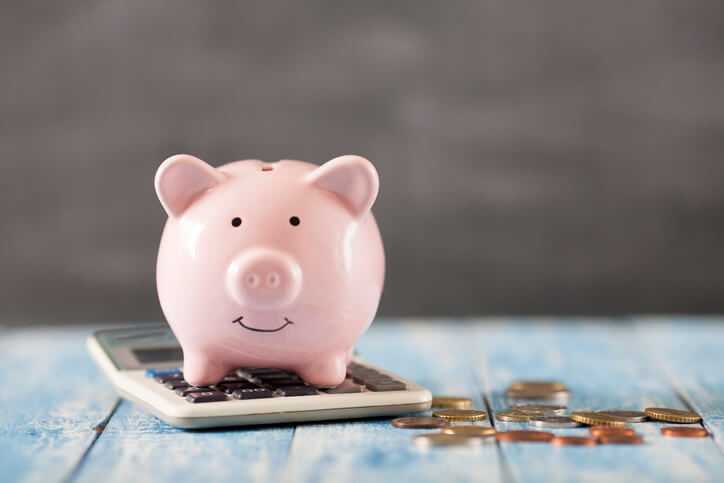The Link Between Money & Mental Health
Many of us have experienced the worry that comes with realizing your bank account isn’t big enough to cover your living expenses. Even if that situation is temporary, the stress that comes from it can have a long-lasting impact! Additionally, many people struggle with long-term financial anxiety as a result of larger economic circumstances, such as recessions and lack of a cushion to fall back on in tough times.
This has gotten worse since the COVID-19 pandemic began in March 2020. According to a report from the American Psychological Association, many Americans say “virtually all aspects of life have been altered” since the start of the pandemic, and close to two-thirds of people say that “life has been permanently altered” due to COVID-19.1 Financial stress was one of the biggest reasons they cited for their feelings.

Clearly, what happens to your money isn’t just a matter of financial health; it’s a matter of mental well-being, too. This article walks you through how your mental health and your finances affect one another, as well as how you can navigate that relationship skillfully and become financially and psychologically healthier.
How Your Money Affects Your Mental Health
A study from the Money and Mental Health Policy Institute revealed that nearly four in ten people with mental health problems say their financial situation makes their mental health issues worse.2 And if you’ve never experienced such problems before, financial issues can have a big psychological impact if they occur.
Confusion and Disorientation
According to Investopedia, only 57% of American adults are considered “financially literate,”3 meaning they understand how personal finance works, have an arsenal of money management skills, and use those skills to effectively navigate their financial lives. As their financial literacy grows, people tend to save more, spend less, make decisions more confidently, and be more optimistic about the future.
For the remaining 43%, yearly taxes, managing interest on things like credit cards, student loans, and cars, and the daily minutia of creating and sticking to a budget are just a few of the interlocking factors that can make personal finance seem confusing. They are vulnerable to certain money problems, including frequent overspending, high levels of debt, and increased risk of falling for financial scams. They also have a higher likelihood of developing other emotional and physiological problems, such as those detailed below.
Anxiety and Stress
The American Psychological Association’s Stress In America survey revealed that about 64% of Americans regularly worry about their finances.4 This is made worse by the fact that most American households are unprepared for unexpected expenses; nearly 40% couldn’t afford an emergency that costs more than $400 to fix.5
Financial stress can have a variety of symptoms, including irritability, struggles with interpersonal relationships, and physical ailments like headaches, stomach problems, and high blood pressure.6 Anxiety may also drive someone to unhealthy saving patterns, where they’re preoccupied with saving money to an unreasonable degree and “oversave.” They might obsess over their savings, never feel as though they’ve saved enough, or deny themselves small, basic pleasures - perhaps even necessities - in order to save as much money as possible.
Guilt and/or Shame
For many of us, money problems are a source of embarrassment. Common situations that can cause financial shame include:
● Not having enough money to pay for necessities like rent, food, or utilities
● Carrying significant debt
● Being declined for a credit card or loan
Among other things, a person struggling with financial shame may deny the severity of their situation (running the risk of making it worse), suffer from low self-esteem, or withdraw from family and friends.7
Envy and Insecurity
Particularly in the era of social media, where you’re only a click or tap away from seeing photos of your friends’ beautiful homes, glitzy nights out, and extravagant vacations, it’s easy to feel envious of what they have. In addition to jealousy, constant comparison to others can lead to painful insecurity if you feel inadequate compared to the more well-off people around you.
The relationship between money and insecurity can become cyclical. A survey from Credit Karma shows that nearly 50% of millennials admit to going into debt in order to keep up with friends, particularly when it comes to spending on food, clothing, and cars.8 About one-third of those surveyed said they’ve racked up more than $500 in debt in this way, and nearly all respondents said that the debt they’ve accumulated makes them feel even more insecure than they did before.9
Depression
Clinical depression affects more than 16 million Americans every year,10 and those living in the grip of financial hardship - particularly if it’s worsened by debt or long-term poverty - run an even greater risk of developing depressive symptoms.
According to the Center for Disease Control and Prevention, depression is more common among people from lower-income households,11 to the extent that 16% of U.S. adults below the poverty line struggle with symptoms of clinical depression.12 These symptoms include persistent feelings of sadness, emptiness, or hopelessness; irritability; decreased energy; cognitive problems, such as difficulty concentrating, remembering, or making decisions; and sudden, drastic changes in sleeping or eating habits.13
How Your Mental Health Affects Your Money
Mental health struggles, even temporary ones, can impact the way you spend, save, and earn money. This can take a big toll on your finances.
Compulsive Shopping and Overspending
Whether you call it “impulse buying,” “emotional spending,” or “retail therapy,” it all refers to the same thing: shopping to feel better when you’re upset. This is an extremely common behavior that costs the average consumer $254 per month, and it’s become even more frequent since the COVID-19 pandemic began.14
When taken to an unhealthy extreme, this is referred to as “compulsive shopping disorder.” Roughly 1 in 20 Americans struggle with compulsive shopping disorder.15 Regular impulsive shopping habits become “disordered” when they’re accompanied by patterns like a short-lived rush of excitement when making new purchases (commonly called a “buyer’s high”), feelings of guilt or remorse shortly after shopping, and hiding purchases or evidence of purchases (e.g. receipts, credit card bills, or shopping bags) after a shopping spree.16
High Medical Costs
The cost of mental health care in the United States has risen steadily over the last decade. As of the most recent reports, Americans spend about $225 billion annually on mental health maintenance, including therapy, psychiatric medications, hospitalizations, and substance abuse treatment.17 For many who deal with long-term mental health concerns, this cost puts them at an economic disadvantage.
Struggles with Employment
Indirect costs, such as missed work days and decreased productivity, make the costs of mental illness pile even higher. According to a study from the World Health Organization, absenteeism because of mental illness affects about 264 million Americans and costs the U.S. about $1 trillion per year.18 This is especially prevalent in workplaces with inadequate health and safety policies, poor communication, and unsupportive leadership.
Increased Risk of Debt
People with mental illnesses are more likely to be in debt than their neurotypical counterparts. A study from the UK’s Money and Mental Health Policy Institute discovered that one in five people living with a mental illness are in “problem debt,” or debt they can’t reasonably repay.19
There are a few factors that contribute to this. For one, many mental illnesses affect a person’s impulse control and decision-making, causing them to spend outside their means; secondly, mental health treatment is expensive and can lead to medical debt; and lastly, some mental health concerns make it difficult for people to find and keep employment, which in turn makes it harder for them to earn money.
Take Control and Break the Cycle
The relationship between your mental health and your money may be difficult right now, but good news - you can improve it by paying off high-interest debt, setting a budget, and practicing gratitude.
Pay Off High-Interest Debt
As of 2020, the average credit card interest rate in the U.S. is about 16%.20 And in an economic landscape where many of those cards have variable interest rates and federal interest rates are rising, it’s important to reduce interest charges by paying down your credit card debt! You can accomplish this in a few ways:
● Make larger monthly payments, and/or make multiple payments per month.
● Combine multiple credit card bills into a single payment with a debt consolidation loan. Get a loan quickly and easily with Upgrade!
● Transfer variable-rate credit card balances to a fixed-rate credit line like Upgrade Card.
Paying off a credit card doesn’t just help you save on interest; it can also boost your credit score over time. For round-the-clock access to your credit score, credit-boosting tips, and more, download Upgrade’s free Credit Health monitoring tool.
Set a Budget and Monitor Your Money
A budget is one of the simplest and most effective ways to regain control of your money. And its benefits are multifaceted; people who budget their money enjoy less stress, greater financial security, and increased feelings of empowerment compared to those who do not.21
Whether you’re a budgeting novice or a pro, there are steps you can take to give you more control over your money. For example, you might consider enrolling in autopay for bills, setting up automatic transfers from your checking to your savings account every payday, and/or using an online money management tool like Mint or You Need a Budget. You can also trim your spending through simple hacks like unsubscribing from marketing emails, waiting until items go on sale before you buy them, and replacing costly expenses (e.g. gym memberships, cafe coffee, dining out) with cheaper alternatives (e.g. working out at home or in free public places, making coffee in your kitchen, and cooking at home more.)
Build an Emergency Fund
Much of the stress related to money comes from fearing unexpected expenses, such as healthcare bills or extensive car repairs, that can upend your financial life. But there’s a way to put these worries at ease!
An emergency fund can help pay for financial surprises when they come up. You can start building yours by setting money aside from every paycheck. If you’re trying to pay off debt, save $1,000 in your fund and then focus on paying off debt; otherwise, make it a goal to save between three- and six-months’ worth of living expenses.
Practice Gratitude
Psychology Today reports several scientifically-proven benefits of gratitude, including improved self-esteem, more fulfilling interpersonal relationships, and better eating and sleeping habits.22 But in addition to healing your mind and body, gratitude can also boost your financial health!
Meghaan Lurtz, former president of the Financial Therapy Association, has researched the intersection of gratitude and financial well-being. She found that when we focus on what we have rather than what we don’t have, our desire to spend money and obtain more decreases. She says, “gratitude can help to quell that ‘I need more, I need different, I need this, I need that’ feeling.” And when that feeling goes quiet, saving money and resisting the temptation to overspend becomes much easier.23
In doing these things, you can feel more control over your money and gain a better outlook on your overall financial situation. But these fixes won’t happen overnight, so be patient yourself as you work your way to financial and mental wellness. Additionally, know when it’s time to reach out and get help from a professional.
When to Seek Help
If financial worries are taking over your life and making you feel powerless, there’s no shame in getting professional help. According to the Association for Behavioral and Cognitive Therapies, you should consider talking to a licensed mental health worker if you experience these symptoms:24
● Loss of enjoyment in activities you used to love
● Feelings of worthlessness, guilt, and/or hopelessness
● Obsessive worrying about things you can’t control
● Thoughts of death and/or of hurting yourself or someone else
The Internet is a great resource for connecting people to the mental health resources they need. You can use tools like BetterHelp, GoodTherapy, or the American Psychological Association’s Psychologist Locator to find therapists near you who specialize in helping patients recover from financial stress.
The Bottom Line
Managing your mental health and your money can seem difficult, but you can make it simpler. Remember that by taking control of your money, you’ll often see improvements in your mental health - and never be afraid to reach out to your family, friends, and/or community for help if you need it.
- Stress In America, American Psychological Association
- Money and Mental Health Facts, Money and Mental Health Policy Institute
- The Push to Require Financial Literacy Education, Investopedia
- Dealing With Financial Stress, American Psychological Association
- Nearly 40% of Americans Can't Cover A Surprise $400 Expense, CBS News
- Coping With Financial Stress, HelpGuide
- The Emotional Effects of Debt, Debt.org
- FOMO Debt On the Rise: Nearly 50% of Millennials Overspend to Keep Up with Friends, Credit Karma
- Feeling "Money Envy?" Here's How to Get Past It, Kasasa
- Depression, Mental Health America
- Prevalence of Depression Among Adults Age 20 and Over, Center for Disease Control and Prevention
- 4 Tips to Cope with Debt Depression, PsychCentral
- Depression, National Institute of Mental Health
- Average American Spent $254 on Impulse Purchases Last 30 Days, Magnify Money
- Understanding Compulsive Shopping Disorder, Verywell Mind
- 5 Patterns of Compulsive Buying, Psychology Today
- What You Need to Know About the Cost and Accessibility of Mental Health Care in America, CNBC
- Mental Health in the Workplace, World Health Organization
- Money and Mental Health Facts, Money and Mental Health Policy Institute
- Average Credit Card Interest Rate By Year, CardRates
- 5 Ways Making and Sticking To a Budget Can Be Good for Your Health, Everyday Health
- 7 Scientifically Proven Benefits of Gratitude, Psychology Today
- How Gratitude Can Help Your Financial Life, NerdWallet
- Deciding When to Seek Treatment, Association for Behavioral and Cognitive Therapies


